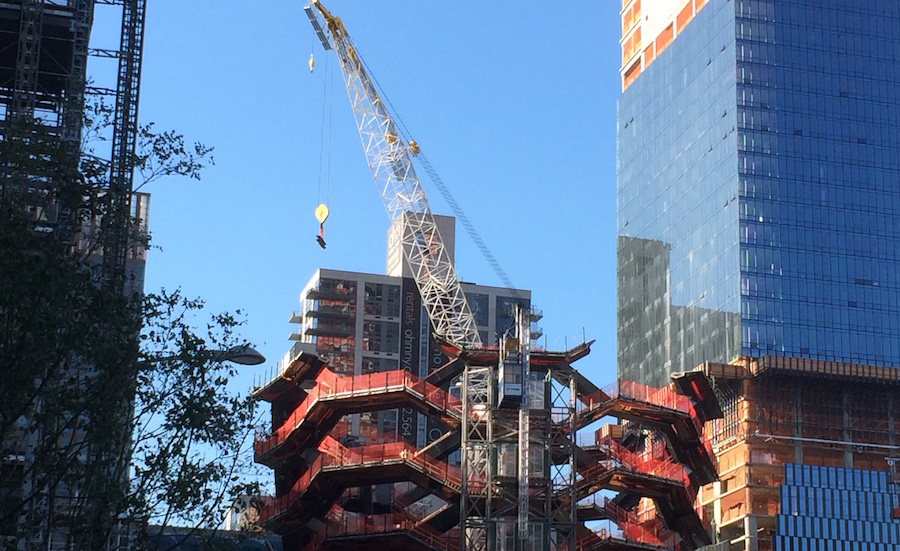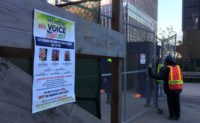Construction Labor
Carpenters Break With New York Building Trades Unions in Pact With Developer
Union regional council is locked in bitter dispute with Related Cos.

A view of the construction work at the massive Hudson Yards development on Manhattan's west side. Photo by Richard Korman for ENR
Union carpenters have formally broken with the other building trades unions that have been protesting outside Related Cos.' massive Hudson Yards development on Manhattan's west side all year. The unions have been trying to hold off Related's goal of negotiating with one trade at a time, a process that could reap significant savings for the developer and concessions from building trades that have already seen their market power badly eroded.
Carpenters Union General President Douglas McCarron said the "old approach limited advancement opportunities and created inherent inefficiencies for us and our contractors."
The developer, the New York City District Council of Carpenters district council and the international union jointly announced Aug. 7 that they had reached a pact whose terms, although not disclosed, apparently cover work rules and wage levels. The union and developer said the agreement would bring job security for existing journey people and apprentices while opening opportunities for new workers to join the union carpenters and help build Hudson Yards.
Carpenters Union General President Douglas J. McCarron said that "the old approach limited advancement opportunities and created inherent inefficiencies for us and our contractors."
Related Cos. President Bruce Beal Jr. hailed the deal as the type of "creative thinking [that] should be replicated throughout the city and the industry and we look forward to more partnerships with union trades on the future phases of Hudson Yards.”
New York City carpenters and other unions have been forced to abide by new rules in recent years, including tiered wage structures that allow nonunion craft workers to participate, and increased employer control of the hiring process. In 2012, Related and the city's building trades had a labor pact in place as work started at Hudson Yards. Several major nonunion contractors worked on the project, too.
Then early this year, as Hudson Yard's next phase was readied, the relationship between Related and the building trades regional council broke down completely. The unions started regular demonstrations and picketing outside the project. The developer declared the Phase 1 project agreement a bust, accusing the unions of corruption that added millions to the first phase's costs. In March, Related filed a lawsuit in state court in Manhattan claiming that the building trades routinely violated the project labor agreement covering work on the project.
Lawsuit Allegations
The suit's accusations include no-show jobs and padded hours that cost the developer "in excess of $100 million" in additional wages, benefits and insurance costs.
The building trades say they have been trying to prevent the developer from building the project's next phase using nonunion employers. "This lawsuit is clearly in retaliation," the Building and Construction Trades Council of Greater New York said in a statement at the time .
The carpenters' new pact with the developer fits the pattern of actions through which Related is seeking concessions from unions and freedom to hire nonunion contractors, according to the building trades regional council. It denounced the carpenters-Related pact as a publicity stunt. The council cited the carpenters' pension fund investment in the project and the hand of the international union in forcing concessions on locals.
Related Cos.' contractors are using numerous nonunion carpenters only blocks away from the main project site, the district council claims. "The national leadership of the Carpenters," the council claims, "completely ignores the local resistance to Related’s underhanded and oppressive tactics."




